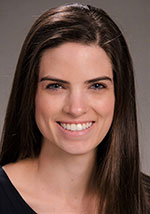Even as they try to deliver the best possible care, dentists can encounter tough issues related to professional ethics. Dr. Lauren Blanchard, now an orthodontics resident at the UW School of Dentistry, found herself facing just such a challenge as a fourth-year UW pre-doctoral dental student.
 A new patient with special needs required treatment for cavities and gum problems, but his mother didn’t wanted him to receive the customary local anesthetic. Saying that he had a fear of needles, she wanted him to receive general anesthesia. Another dental office had been unable to complete his treatment. The mother also had developed a mistrust of health-care providers, prompting her to question professional advice.
A new patient with special needs required treatment for cavities and gum problems, but his mother didn’t wanted him to receive the customary local anesthetic. Saying that he had a fear of needles, she wanted him to receive general anesthesia. Another dental office had been unable to complete his treatment. The mother also had developed a mistrust of health-care providers, prompting her to question professional advice.
For this patient, general anesthesia would pose a significant risk – but the need for treatment was pressing. In the face of this, and considering the mother’s mistrust, how should the dentist proceed?
Dr. Blanchard grappled with these and related questions in an essay written for the American Society for Dental Ethics. And her treatment of the issues has earned her the society’s 2019 Ozar-Hasegawa Ethics Award, given annually to a dental or dental hygiene student for an essay or other form of ethical reflection.
“I am very proud of Dr. Blanchard, who shows why good patient care requires much more than technical skill,” said Interim Dean Gary Chiodo. “Her essay reflects a thoughtful, sensitive approach to her patient’s needs and a clear desire to adhere to the highest professional standards. It also reflects the values that we strive to impart to all our students.”
Dr. Blanchard met her patient and his mother during her rotation in the School of Dentistry’s DECOD program, which stands for Dental Education in Care of Persons with Disabilities. The DECOD clinic provides care for patients with acquired or development disabilities. These conditions include autism, cerebral palsy, Down syndrome, intellectual disability, multiple sclerosis, muscular dystrophy, stroke, traumatic brain injury, and others.
Dr. Blanchard’s recognition is the second Ozar-Hasegawa award for a UW student in the last three years. In 2017, fourth-year student Timothée Cousin won for an essay titled “The Vulnerable Patient.”